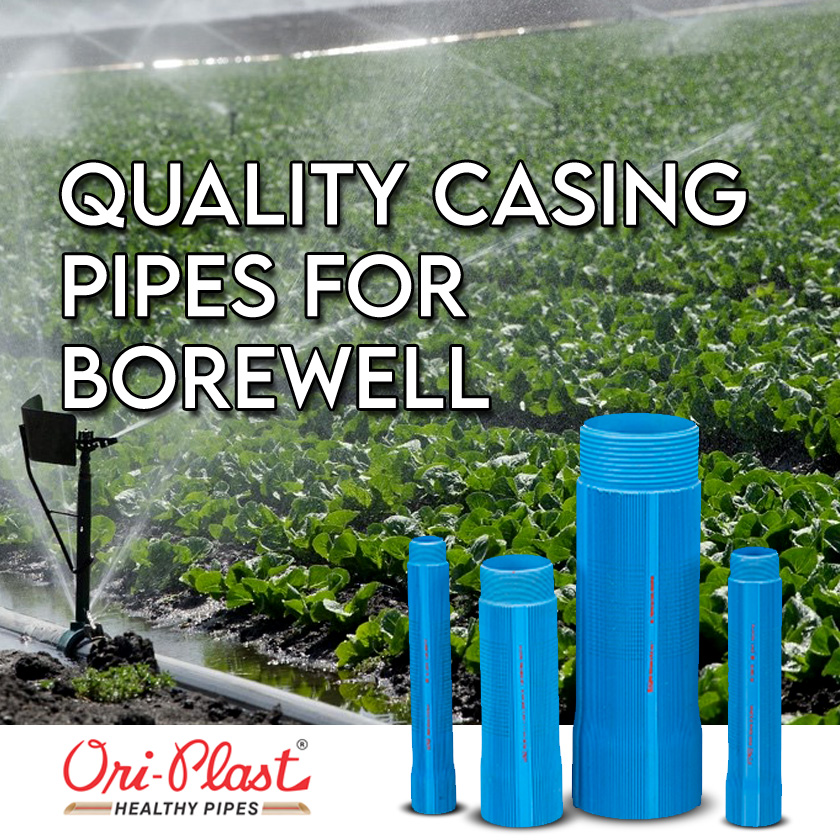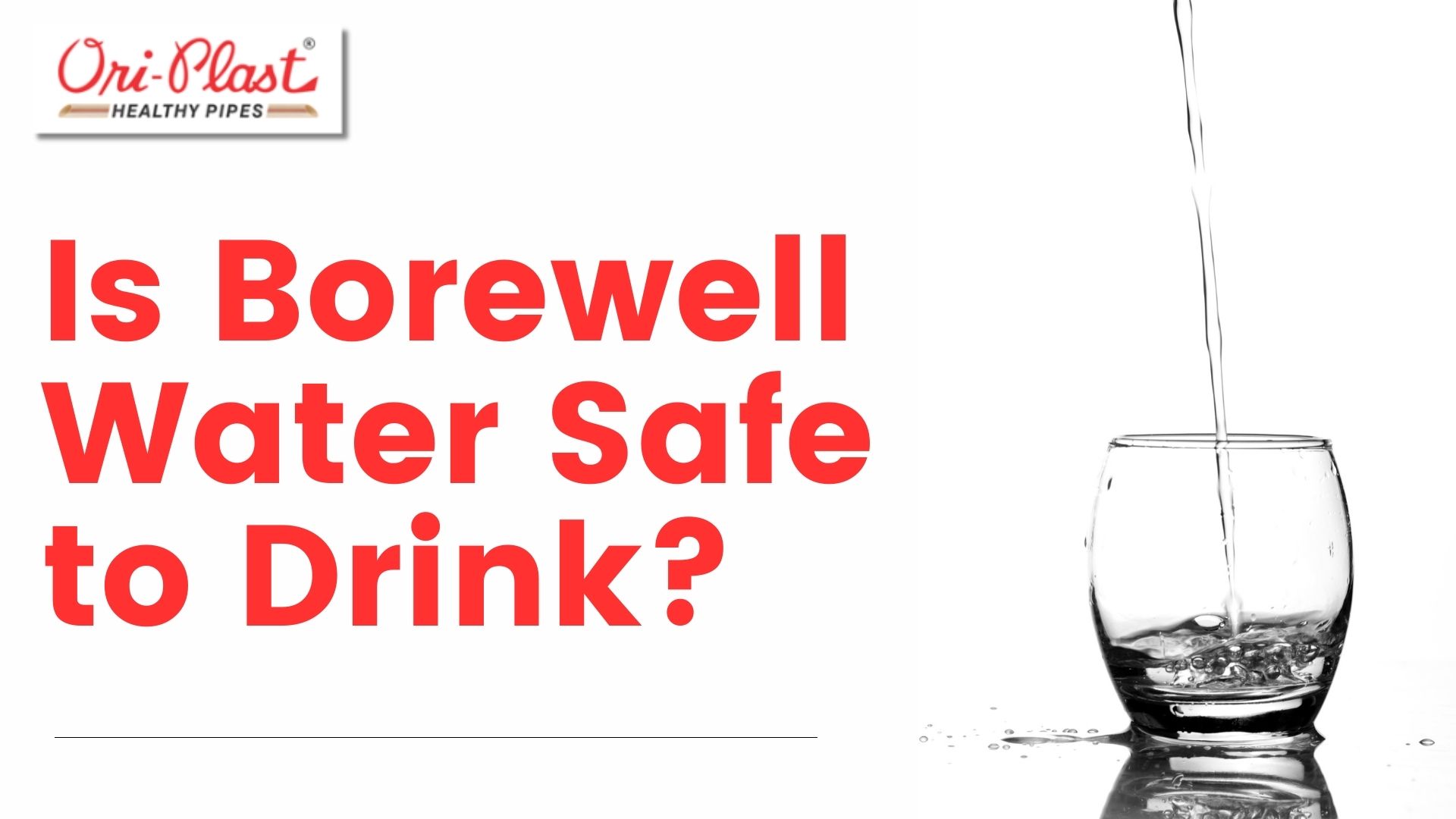The Best Pipe for Borewell Casing
When it comes to setting up a borewell, selecting the right casing pipe is crucial for the overall efficiency and longevity of the well. The casing pipe not only protects the wellbore from collapsing but also prevents contamination of the water source.
With various options available in the market, it's essential to understand which pipe is best suited for borewell casing. Let’s get started with :
PVC Casing Pipes:
PVC (Polyvinyl Chloride) casing pipes are a popular choice for borewell casing due to their durability, cost-effectiveness, and easy installation. PVC pipes are resistant to corrosion, chemicals, and most types of water, making them suitable for a wide range of applications.
Their smooth interior surface allows for efficient water flow and reduces the chances of clogging. PVC casing pipes are lightweight and require minimal maintenance, making them an excellent choice for both shallow and deep borewells.
Pros of PVC Casing Pipes:
Cost-effective: PVC casing pipes are relatively inexpensive compared to other types of casing pipes, making them a budget-friendly option for borewell casing.
Lightweight: PVC pipes are lightweight, making them easy to transport, handle, and install. This reduces labor and installation costs.
Corrosion resistance: PVC pipes are highly resistant to corrosion, making them suitable for various water conditions. They can withstand acidic or alkaline water without deteriorating.
Smooth interior surface: PVC casing pipes have a smooth interior surface, which minimizes friction and allows for efficient water flow. This reduces the chances of clogging and improves the overall performance of the borewell.
Low maintenance: PVC pipes require minimal maintenance once installed. They do not require painting or coating to prevent corrosion, saving both time and money.
Versatility: PVC casing pipes are available in different diameters and lengths, allowing for customization according to the borewell requirements. They can be easily cut and joined to fit any depth.
Cons of PVC Casing Pipes:
Limited strength: PVC pipes have relatively lower tensile strength compared to other materials like stainless steel or HDPE. They may not be suitable for deep borewells or areas with high water pressure.
Vulnerability to UV rays: If exposed to direct sunlight for prolonged periods, PVC pipes may degrade due to UV radiation. It is important to protect PVC casing pipes from sunlight using appropriate covers or by burying them underground.
Temperature limitations: PVC pipes have temperature limitations and may not be suitable for extremely hot or cold environments. They may become brittle in very cold temperatures or soften in high heat.
Not suitable for certain chemicals: While PVC pipes are resistant to many chemicals, they may not be compatible with certain solvents or highly concentrated acids. It is important to consider the specific water chemistry and potential chemical interactions when choosing PVC casing pipes.
Lifespan: PVC pipes have a relatively shorter lifespan compared to materials like stainless steel. However, with proper installation and regular maintenance, they can still provide a satisfactory lifespan for most borewell applications.
It is essential to consult with professionals or experts in borewell installation to determine whether PVC casing pipes are suitable for your specific project, taking into account factors such as water conditions, borewell depth, and environmental factors.
HDPE Casing Pipes:
HDPE (High-Density Polyethylene) casing pipes have gained significant popularity in recent years. They offer excellent strength, resistance to chemicals, and durability, making them suitable for demanding borewell applications.
HDPE pipes are known for their flexibility, allowing for easy installation even in challenging terrains. These pipes are resistant to cracks, leaks, and corrosion, ensuring a long lifespan for the borewell. HDPE casing pipes also provide good thermal insulation and are environmentally friendly.
Pros of HDPE Casing Pipes:
Durability: HDPE casing pipes are highly durable and have excellent resistance to impact, abrasion, and cracking. They can withstand harsh environmental conditions, making them suitable for challenging terrains and deep borewells.
Chemical resistance: HDPE pipes have high chemical resistance, making them suitable for borewells with corrosive or chemically aggressive water. They can resist a wide range of chemicals and contaminants, ensuring the purity of the water source.
Flexibility: HDPE casing pipes are flexible and can be easily bent to follow the contour of the borewell. This flexibility allows for easier installation, especially in areas with uneven terrain or tight spaces.
Longevity: HDPE pipes have a long lifespan, often exceeding 50 years. They are resistant to degradation from UV radiation, chemicals, and natural elements, ensuring long-term reliability and reduced maintenance costs.
Smooth interior surface: Similar to PVC pipes, HDPE pipes have a smooth interior surface that promotes efficient water flow and minimizes the risk of clogging. This improves the overall performance and efficiency of the borewell.
Environmentally friendly: HDPE pipes are considered environmentally friendly as they are recyclable and have a lower carbon footprint compared to other materials. They can contribute to sustainable borewell projects.
Cons of HDPE Casing Pipes:
Higher cost: HDPE casing pipes tend to be more expensive compared to PVC or galvanized iron pipes. However, the higher upfront cost is often offset by their durability and longevity, resulting in long-term cost savings.
Lower thermal resistance: HDPE pipes have lower thermal resistance compared to materials like stainless steel. In high-temperature environments, they may deform or soften, potentially affecting the integrity of the borewell casing.
Expansion and contraction: HDPE pipes have a higher coefficient of thermal expansion compared to other materials. In areas with extreme temperature variations, proper allowances should be made to accommodate the expansion and contraction of the pipes to avoid potential issues.
Joining methods: HDPE pipes require specialized fusion techniques for joining. This may require trained personnel or specialized equipment for installation, which can add to the overall installation costs.
Limited pressure rating: HDPE pipes have a lower pressure rating compared to materials like stainless steel. It is important to ensure that the selected HDPE casing pipes can withstand the anticipated water pressure in the borewell.
It is crucial to consult with professionals or experts in borewell installation to determine whether HDPE casing pipes are the most suitable option for your specific project.
Factors such as borewell depth, water conditions, and environmental factors should be considered to ensure the optimal performance and longevity of the borewell system.
Stainless Steel Casing Pipes:
Stainless steel casing pipes are known for their exceptional strength and corrosion resistance. These pipes are ideal for borewells in areas where the water is highly corrosive or contains contaminants.
Stainless steel casing pipes can withstand extreme temperatures, making them suitable for deep borewells. Although they are relatively expensive compared to other options, their longevity and robustness make them a worthwhile investment, especially in areas with challenging water conditions.
Pros of Stainless Steel Casing Pipes:
Exceptional strength and durability: Stainless steel casing pipes are renowned for their superior strength and durability. They can withstand high water pressure, heavy loads, and extreme environmental conditions.
Stainless steel pipes are highly resistant to corrosion, rust, and chemical reactions, ensuring a long lifespan for the borewell.
Corrosion resistance: Stainless steel pipes have excellent corrosion resistance, making them ideal for borewells with highly corrosive water or areas with aggressive soil conditions. They provide reliable protection against rust and corrosion, ensuring the integrity of the borewell casing.
Thermal resistance: Stainless steel pipes can withstand a wide range of temperatures, including extreme hot and cold conditions. They maintain their structural integrity and performance even in environments with significant temperature variations.
Hygienic properties: Stainless steel is a non-toxic and hygienic material, making it suitable for borewells used for drinking water or other sensitive applications. It does not leach harmful substances into the water, ensuring the purity and safety of the water source.
Low maintenance: Stainless steel casing pipes require minimal maintenance over their lifespan. They do not require painting or coatings to prevent corrosion and are easy to clean. This reduces maintenance costs and efforts.
Aesthetically pleasing: Stainless steel casing pipes have a sleek and attractive appearance, adding a touch of elegance to the borewell installation. They are often used in applications where aesthetics are important.
Cons of Stainless Steel Casing Pipes:
Higher cost: Stainless steel casing pipes are generally more expensive compared to other materials such as PVC or galvanized iron. The initial investment may be higher, but the long lifespan and durability of stainless steel can offset the higher cost over time.
Difficult installation: Stainless steel pipes are heavier and less flexible compared to materials like PVC or HDPE. They require specialized equipment and experienced professionals for proper installation. The installation process may be more time-consuming and costly.
Thermal conductivity: Stainless steel has higher thermal conductivity compared to materials like PVC or HDPE. This means that in extremely hot or cold conditions, the temperature of the water inside the casing may be affected by the ambient temperature.
Availability: Depending on the location and suppliers, the availability of stainless steel casing pipes may be limited compared to other materials. This could impact the ease of sourcing and installation.
It is crucial to consult with professionals or experts in borewell installation to determine whether stainless steel casing pipes are the most suitable option for your specific project.
Factors such as water quality, borewell depth, budget, and environmental factors should be considered to ensure the optimal performance and longevity of the borewell system.
Galvanized Iron Casing Pipes:
Galvanized iron (GI) casing pipes are widely used for borewell casing due to their affordability and durability. These pipes are coated with a layer of zinc, protecting against rust and corrosion.
GI casing pipes are suitable for shallow borewells and can withstand moderate water pressure. However, it's important to note that over time, the zinc coating may wear off, making the pipe susceptible to rusting. Regular maintenance and inspections are necessary to ensure the longevity of GI casing pipes.
Pros of Galvanized Iron (GI) Casing Pipes:
Affordability: Galvanized iron casing pipes are relatively inexpensive compared to other materials like stainless steel. They offer a cost-effective solution for borewell casing, especially for shallow borewells or projects with budget constraints.
Durability: GI casing pipes are known for their durability and strength. The galvanized coating protects against rust and corrosion, extending the lifespan of the pipes. With proper maintenance, GI pipes can have a satisfactory lifespan for many borewell applications.
Availability: Galvanized iron pipes are widely available in the market, making them easily accessible for borewell projects. They can be found in various sizes and lengths, allowing for installation flexibility.
Suitable for moderate water pressure: GI casing pipes can withstand moderate water pressure, making them suitable for shallow borewells. They can effectively protect the wellbore from collapsing and provide structural support.
Ease of installation: Galvanized iron pipes are relatively lightweight and easy to handle and install. They can be cut and joined using simple tools, making the installation process more straightforward and cost-effective.
Cons of Galvanized Iron (GI) Casing Pipes:
Limited corrosion resistance: While the galvanized coating provides some level of corrosion resistance, it can wear off over time, leaving the iron susceptible to rusting. In areas with aggressive water conditions or high levels of corrosive substances, the lifespan of GI pipes may be reduced.
Maintenance requirements: Galvanized iron pipes require regular maintenance to ensure the integrity of the galvanized coating. Inspection, repairs, and re-coating may be necessary to prevent rust and corrosion. Neglecting maintenance can lead to reduced performance and premature failure.
Weight limitations: Galvanized iron pipes are heavier compared to materials like PVC or HDPE. This can make handling and installation more challenging, especially for deep borewells or projects with difficult terrains.
Limited temperature tolerance: Galvanized iron pipes have limitations in extreme temperature conditions. They may be prone to expansion and contraction, which can affect the overall stability and performance of the borewell casing.
Potential for water contamination: In rare cases, the galvanized coating may introduce zinc or other substances into the water, which can impact the water quality. It is important to ensure the galvanized coating is of high quality and compatible with the intended water use.
When considering galvanized iron casing pipes for borewell projects, it is essential to assess the water conditions, borewell depth, and maintenance capabilities.
Regular inspection and maintenance will help prolong the lifespan of the pipes and ensure the continued efficiency of the borewell system. Consulting with professionals or experts in borewell installation is recommended to make an informed decision.
Conclusion
Selecting the right pipe for borewell casing is essential for the success of your water well project. PVC, HDPE, stainless steel, and galvanized iron pipes all offer distinct advantages and are suitable for different applications.
PVC pipes are cost-effective and easy to install, while HDPE pipes provide strength and flexibility. Stainless steel pipes are ideal for corrosive water conditions, and galvanized iron pipes offer affordability.
Consider factors such as water quality, depth of the borewell, and budget when making your decision. Consulting with a professional or reputable supplier will help you choose the best pipe for your specific needs, ensuring a reliable and long-lasting borewell system.
Get the best Borewell Column pipes from leading PVC pipe manufacturers in India.



